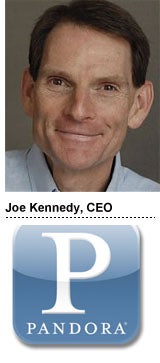 Although internet radio streamer Pandora continued to post a loss a year after going public, signs of progress on driving mobile revenue was enough to give investors confidence following the company’s Q2 earnings on Wednesday, as shares were up 12 percent. Ad spending on Pandora in the quarter grew 53 percent and makes up the bulk of its revenues, as ads generated $89.3 million, while subscriptions and “other services” brought in just $11.8 million.
Although internet radio streamer Pandora continued to post a loss a year after going public, signs of progress on driving mobile revenue was enough to give investors confidence following the company’s Q2 earnings on Wednesday, as shares were up 12 percent. Ad spending on Pandora in the quarter grew 53 percent and makes up the bulk of its revenues, as ads generated $89.3 million, while subscriptions and “other services” brought in just $11.8 million.
Although Pandora has made efforts to improve the listening and advertising environment on the desktop, the service is primarily mobile — total mobile revenues in the quarter were $59.2 million, a gain of 86 percent year-over-year — and it will surely stay that way. But with mobile advertising in general bringing in less than $2 billion, compared to the $30 billion-plus going to all of online, making money from smartphones and tablets is still a challenge. As Pandora outlined last spring, the company is focusing on building a local media buying platform designed to tap the existing $16 billion terrestrial radio market. Pandora CEO Joe Kennedy told analysts on Wednesday that the media buying platform should be complete by year’s end. He expects that platform to supplement its direct sales, while allowing Pandora to reduce its use of third parties.
“Once integration [of the local media buying platform] is in place, we see tremendous opportunity for increased monetization and anticipate significant expansion of the number of markets in which we have a local presence,” Kennedy said. “While we have tremendous focus on mobile monetization, we’re also investing heavily to ensure that we maintain and expand our category leadership as the best personalized radio experience in the world in the mobile environment.”
Kennedy also outlined plans to continue to increase Pandora’s sales teams, while relying less on what he called “third parties.” Given Pandora’s pressures from rising royalty costs and service-related expenses, building out the sales force will certainly test investors’ patience through next year. The CEO attempted to make the case that direct sales are more valuable, and therefore will ultimately more than offset the costs. (Kennedy told analysts that Pandora added 127 staffers over the past year.)
“In terms of mobile pricing, we continue to see that where we direct sell advertising whether it’s on mobile or on the desktop that these CPM price realization of a direct sales product on mobile and desktop are in the same ballpark,” Kennedy said. “I think what you can see from the numbers we released, the big delta as we previously articulated is the difference between when we direct-sell an ad versus when it’s sold through a third party. The price realization through a third party is significantly lower compared with when we direct sell it or sells and that really is the dominant difference.”
In making a case for mobile, Kennedy cited a survey released by the Mobile Marketing Association that said advertisers believe 7 percent their marketing budgets should be spent on mobile, while a year ago, marketers said they would spend 1 percent or less in the space.
“Those numbers reflect the view that mobile drives ROI,” Kennedy said. “The consumer’s focus on a mobile device is dramatically different and more intense than the focus that a consumer typically gives a consumer screen and I think that is reflected in the kind of clickthroughs and other response rates that marketers have seen and continue to see on the mobile device.”










